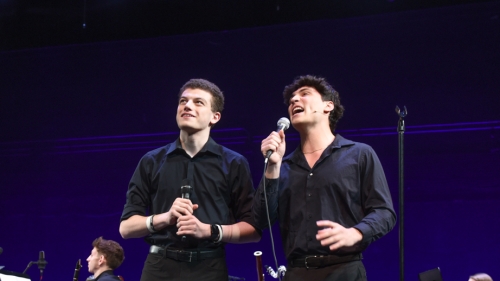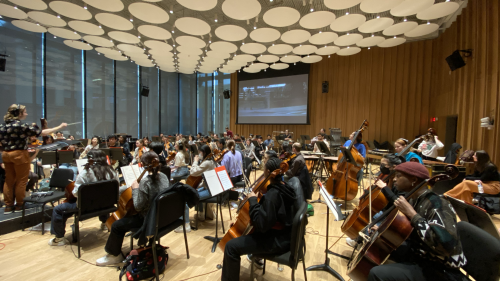
Elena Shaddow, a graduate of the NYU Steinhardt Program in Vocal Performance, got her start in Les Misérables on Broadway during her senior year. She likes to say she is living proof that Steinhardt works. Since then, she has performed in Sweet Smell of Success, Nine, Fiddler on the Roof, The Woman in White, La Cage Aux Folles, The Bridges of Madison County, and The Visit, as well as many Off-Broadway shows, national tours and regional productions.
Talk about the value of passing on the torch.
What we do as teachers is a craft; it needs to be passed on. Otherwise, it morphs so quickly and you lose the part of training that makes technique technique. The saying “Those who can’t do, teach,” is horrible. Those who do, should teach. Teachers are mentors passing on knowledge. I feel incredibly humbled by this position. I teach acting through song and singing, which I have been doing professionally for the last 24 years. I also teach song analysis to graduate students, where we break down the lyrics and circumstances of a song. The idea is when you’re singing a piece of music, you are living inside of it.
Other benefits of learning through a professional?
I speak from experience. I can explain what works for me, and what works for others I have seen in the industry. Being able to share years of experience, and say what is normal and what will happen, is very helpful to students. To be able to reassure, and to redirect. Because I am still actively performing, I continue to hone my craft so I can say, “I’m not just preaching this, I am also practicing.”
Your voice changes as you age, and your knowledge of your instrument, not just your voice, but your body, your soul, and your mind – it’s a lifelong relationship. Dianna Heldman (NYU Steinhardt Associate Director of Applied Voice) has been incredibly generous and understands my quirks, my insecurities, my limits. She’s helped me find my strengths as a singer, and we continue developing that, which I'm then able to pass on to my students.
What makes Steinhardt’s graduate program different from others?
What sets the Steinhardt grad program apart is that at the end of two years, the master's candidate has a full one-hour recital. It’s wonderful to showcase yourself and give a lecture about a topic relevant to the industry and your master's work. The recital is done in front of the candidate’s voice teacher, voice coach, and other faculty who are there to grade. Friends and family are also invited.
And the undergraduate program?
Our undergraduates receive a wonderful liberal arts education, while still focusing on their craft. To me, it’s a no-brainer to come to NYU if you want to be a performer. Many faculty in our program are in touch with current industry professionals, including composers, playwrights, actors, directors, and stage managers, some of whom I have worked with on Broadway, and many of whom live in New York City. You can’t substitute that.
You are exposed to so many resources when you come to Steinhardt – mentors who get to know you and introduce you to the NYC theater and singing community. We are 60 blocks south of the MET, where these students want to be performing in 4 years.
What advice do you have for those contemplating a career in vocal performance?
Be patient with yourself, and don’t strive for perfection because there is no such thing. Strive for truthfulness in your work, and have patience in an industry that is constantly changing. It can feel difficult and frustrating when you don't book right away, but that doesn't mean you're not going to. Get used to being rejected, and continue to believe in yourself. That creates a steely fortitude.


